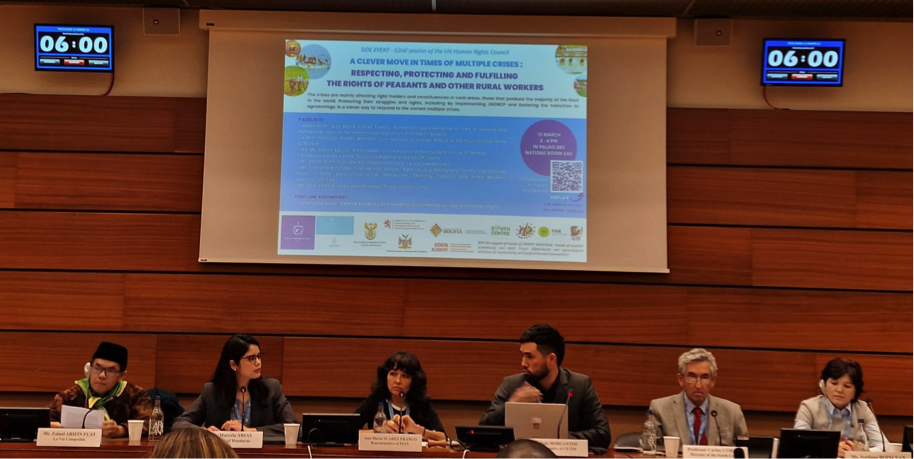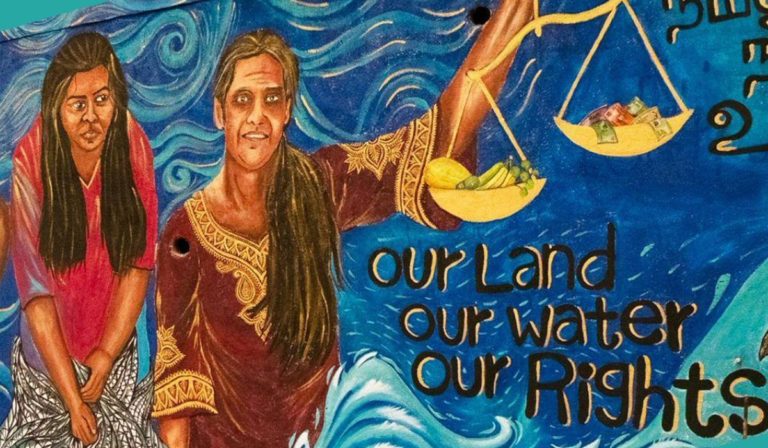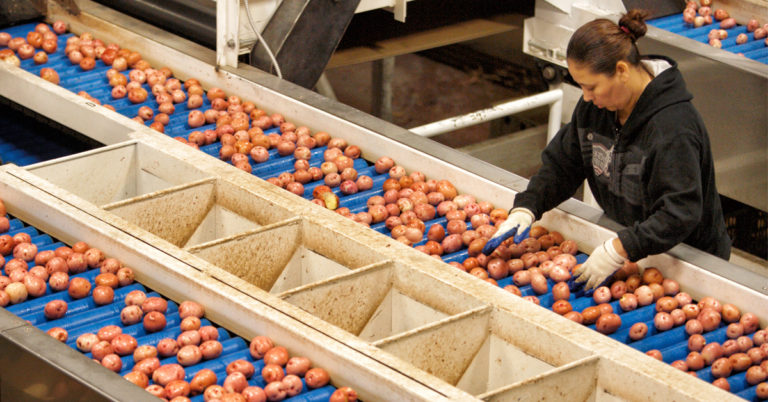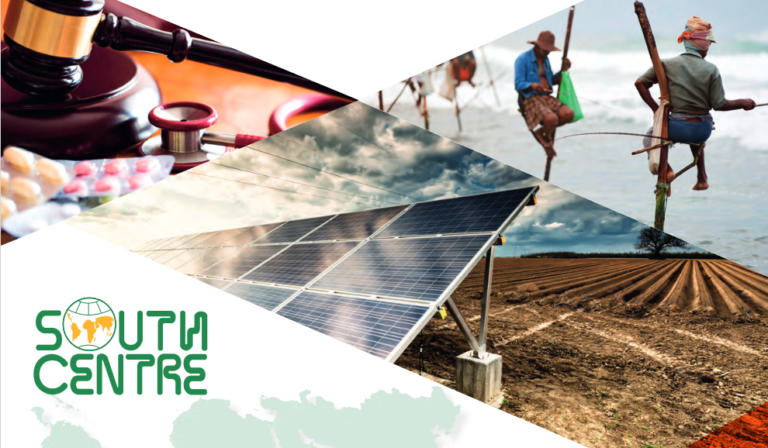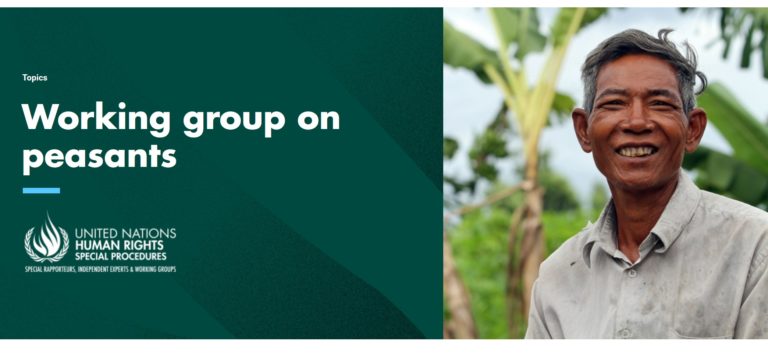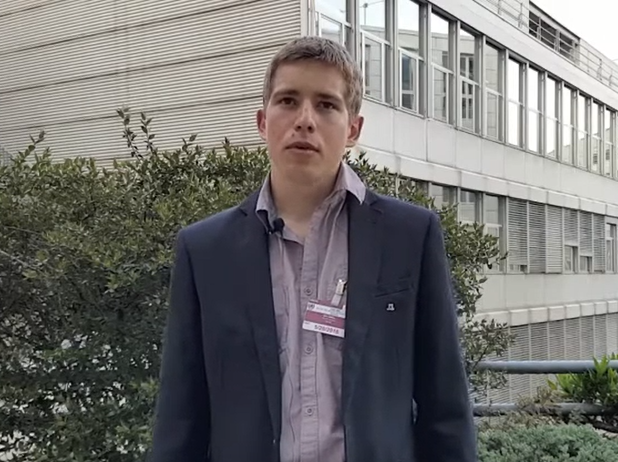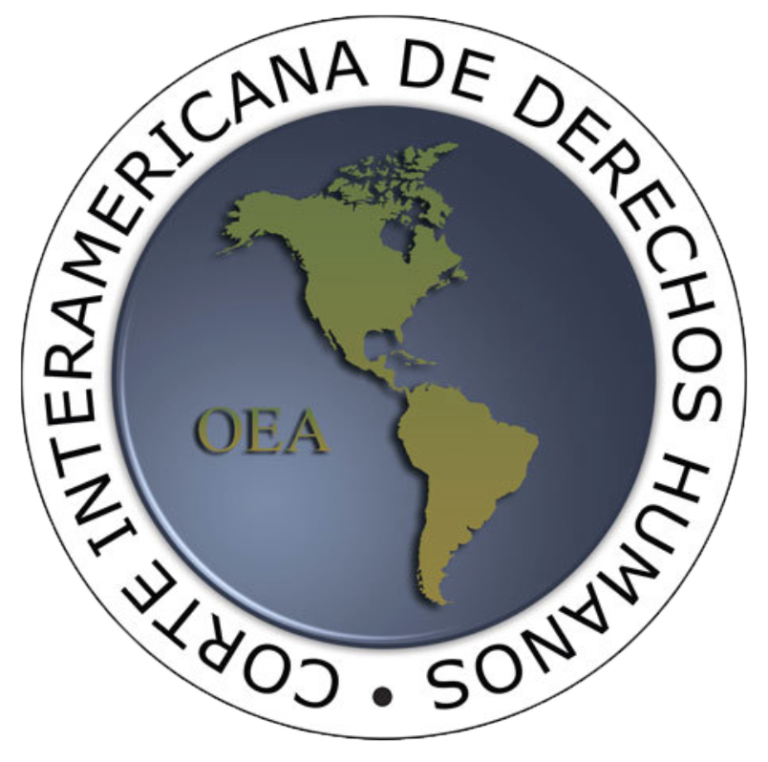Human Rights Council Side Event: The Rights of Peasants and Rural Workers in times of multiple crises held in Geneva
This article was originally published in the website of the South Centre
A side-event to the 52 session of the United Nations (UN) Human Rights Council, titled “Respecting, protecting and fulfilling the rights of peasants and other rural workers – A clever move in times of multiple crises” was held at the Palais des Nations, Geneva on 15 March 2023. The side-event was co-organized by the Permanent Missions of the Plurinational State of Bolivia, Honduras, Cuba, South Africa, Luxembourg, South Centre, La Via Campesina, Centre Europe – Tiers Monde (CETIM), FIAN International and the Geneva Academy of international humanitarian law and human rights; with the support of some other partners.
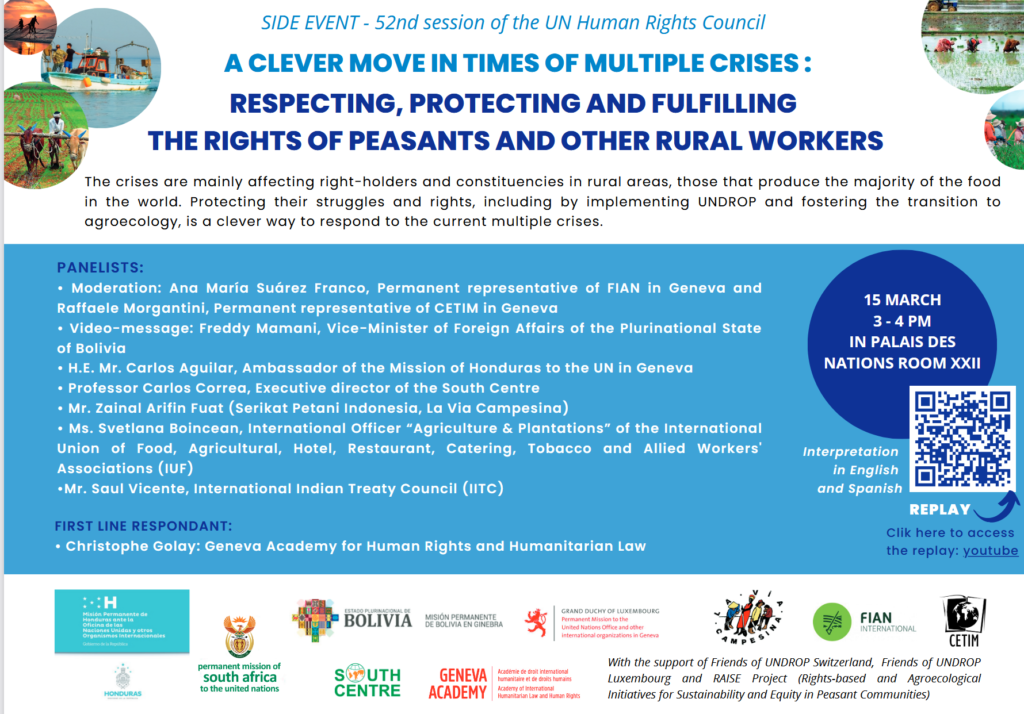
The objective of the side event was to raise awareness about the contributions of peasants and other people working in rural areas to face the ongoing multiple crises, and discuss measures that can be adopted at national and regional level with the aim of respecting, protecting and fulfilling peasants’ rights. It also sought to encourage greater collaboration towards the implementation of the UN Declaration on the Rights of Peasants and other people working in rural areas (UNDROP), and highlight the initiative to create a new UN Special Procedure on the matter.
Raffaele Morgantini from CETIM welcomed the participants to the side-event and underscored the important role that peasants and rural communities had played in the adoption of UNDROP in 2018, which was particularly promoted by La Via Campesina. The UNDROP was supported by many developing countries, but Portugal and Luxembourg were the only countries from the European Union who also supported the adoption of the Declaration in 2018. The implementation of the Declaration at national and international levels could contribute to face the current multiple crises. The rise of ecological, social crises, concentration of capital and power, health crises are fuelling anti-democratic systems and impacting the lives of peasants and rural workers, especially in developing countries. UNDROP provides possible solutions to these issues, including through developing a common roadmap for fair, sustainable agro-ecological systems.
H.E. Freddy Mamani, Vice-Minister of Foreign Affairs of the Plurinational State of Bolivia, spoke via video message, stressing the structural view to issues such as the global food crises which has led to 190 million people facing acute food insecurity, with risk of increasing famines. The global economic system based on extractivism has led to increased global hunger. With growing power of large transnational corporations, rights of peasants such as access to land, seeds and water are being limited. Unjust structural conditions are reinforcing power and capital accumulation, while violence and the structural inequality maintaining unjust circles are leading to widespread human rights violations. There is a need to include vulnerable peoples and close gaps in human rights protections, especially in rural areas. Ensuring access to seeds, land, technology is essential to achieving the aims of climate justice. UNDROP is an outcome of inclusive negotiations, incorporating global peasant movements whose efforts and importance need to be recognized. Now there is the need to move forward with the implementation of UNDROP, which can support the fight against poverty and discrimination. Peasants cannot be left behind in recovery and sustainable development. The Vice-Minister concluded by calling on countries to work towards socialization and implementation of UNDROP.
Marcela Arias from the Mission of Honduras then spoke about how the multiple social and economic crises, as well as the impacts of the COVID-19 pandemic, have increased poverty. Climate change is making matters worse for many rural communities, which were already suffering. Honduras has a large number of peasants, and the government has been taking measures to reduce their land tenure vulnerability and revert past human rights violations. There are also structural measures being implemented to increase food sovereignty, which involve giving more rights and dignity to peasants. She expressed the commitment of Honduras to working together for realizing human rights for all, including the right to development, economic, social and cultural rights, and helping effectively address the mandate of implementing the UNDROP.
Dr. Carlos Correa, Executive Director at the South Centre, spoke about the work of the South Centre in supporting the UNDROP and its implementation. Dr. Correa expressed support for creating a new UN special procedure for implementation of the UNDROP, and how it can help realize fundamental rights, including the right to land. Noting the importance of recognizing the role of women peasants, Dr. Correa said that the access to seeds and preserving traditional knowledge of peasants are vital for realizing the right to food. However, agri-business practices and laws have imposed limitations on traditional peasants’ practices, notably the ancestral practice of saving and re-using seeds. Highlighting restrictions on farmers’ rights to use seeds, such as via the International Union for the Protection of New Varieties of Plants (UPOV) or patents, Dr. Correa said that, paradoxically, in some European countries and Switzerland, patent laws allow for broader exceptions than those available in many developing countries. Thus it is important to implement UNDROP at all levels, working with all stakeholders to remove restrictions on the rights of peasants. In access to seeds, peasants and rural workers should be free to preserve their food sovereignty.
Zainal Arifin Fuat representing Serikat Petani Indonesia/La Via Campesina said that the current extractive development paradigm is deepening gaps and inequalities. The conflict in Ukraine is having repercussions on food security, while the over-reliance on imports for food grains is increasing hunger in developing countries. The problem is not the lack of food, but the speculative trading system which restricts its availability to all. The implementation of UNDROP presents an opportunity to correct these issues. The Special Rapporteur on the right to food has highlighted that governments are not acting quickly in dealing with food crises. Governments need to create a concrete cooperation process and plan of action to tackle the food crisis. Supporting peasants in developing countries and increasing investment in sustainable agriculture, local and regional food systems to reduce reliance on imports and increase food security are vital. There is the need to ensure the rights of vulnerable people and create a new process to implement UNDROP, which can help move away from a profit driven system to a people centred system.
Svetlana Boinceau, from the International Union of Food, Agricultural, Hotel, Restaurant, Catering, Tobacco and Allied Workers’ Associations (IUF) representing workers in the entire food chain spoke next. She highlighted that the agricultural sector employs the largest number of wage workers in the world, yet many of them suffer from hunger and malnutrition. Despite being designated as essential workers during the pandemic, they were not given adequate protections. Labour laws either don’t cover them or are not properly implemented, which leads to their rights not being respected. The available national and international standards all have exceptions that end up excluding agricultural workers and leaving them without legal protection. The UNDROP is a useful instrument, but it must be fully implemented to improve the situation of workers. It is particularly urgent as climate change is making conditions worse for agricultural workers.
Saul Vicente Vasquez representing the International Indian Treaty Council (IITC), also spoke via video message. He highlighted that there are about 476 million indigenous people around the world, which includes many women and young people. They are facing serious threats, and pollution is making their situation worse. Peasants are facing degraded lands and an increase in deforestation, which is leading to further biodiversity loss. Agriculture is not sustainable if it is reliant on deforestation, as is the case in some Latin American countries. Peasants and rural workers help support biodiversity, rural development, and preservation of cultural rights, as for them land and water form an indivisible unit. Private appropriation of land is unimaginable in such contexts. He called on further using traditional knowledge to revive damaged ecosystems.
Christophe Golay from the Geneva Academy for Human Rights and Humanitarian Law reiterated support to creating a new special mechanism under the aegis of the Human Rights Council to ensure the effective implementation of UNDROP. He also informed about the launch of a new website on defending peasants’ rights and promoting the implementation of the UNDROP (https://defendingpeasantsrights.org/).
Following the panel, there were some interventions from the floor.
Cuba reiterated its support to the implementation of UNDROP, noting that peasants’ efforts are critical in food production. Highlighting the risks that peasants have in facing with the multiple crises, there is a need to address the unfair international order and change the international financial architecture which worsens these crises. Rethinking issues such as foreign debt, Official Development Aid (ODA), technology transfer, and strengthening special and differential treatment for developing countries, is required.
South Africa said that given the multitude of evolving crises, ensuring the advance of all human rights universally and without discrimination is important. Peasants’ rights intersect with the right to food and the environment, especially in rural areas. These are also included in the South African constitution. The issues of food sovereignty, dignity and peasant’s rights are linked and need to be fully implemented.
Portugal took the floor next, noting that the right to food and peasants’ rights as can be found in the UNDROP also find mention in their national Constitution. It therefore also supported the implementation of the Declaration and the evolution of these rights in international law.
Ana Maria Suárez-Franco from FIAN International gave the concluding remarks, noting the consensus views in the room of the impacts of ongoing multiple crises on peasants, and said that peasants and rural workers are contributing with solutions for sustainable agro-ecology and the planet.
She emphasised that having the UNDROP is good, but its implementation at all levels is key, including through international cooperation for effective measures to be taken to protect the rights of peasants. A new UN special procedure on the rights of peasants, which would need to be established through a resolution in the Human Rights Council, would be critical. Having a fragmented way to monitor the implementation of UNDROP is insufficient and can lead to gaps in human rights protections. A specific, dedicated mechanism is necessary for fulfilling the rights of peasants and of those working in rural areas, who ultimately are responsible for putting food on our plates.
Watch the video of the event:
Author: Danish is Programme Officer of the Sustainable Development and Climate Change Programme (SDCC) of the South Centre.

